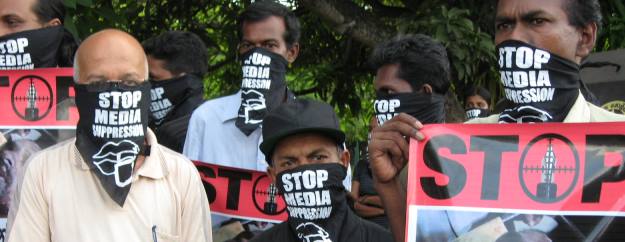[This article is being reproduced in the memory of the prominent SriLankan Civil Rights advocate and an eminent lawyer R,K.W. Goonesekera, who passed away on 10th Nov 2014]
The R.K.W. Goonesekera Committee Report
The Report of the Committee to Advise on the Reform of Laws Affecting Media Freedom and Freedom of Expression, popularly known as “the R.K.W. Goonesekere Committee Report”, was in many ways the genesis of media reform initiatives in Sri Lanka. This comprehensive Report examined virtually every aspect of the media and presented a host of recommendations, which established the foundation for reform efforts to follow. Notably, despite the lapse of fifteen years, key recommendations presented in the Report remain unimplemented today.
The mandate of the Committee was to:
“ Study all existing legislation and regulations affecting media freedom, freedom of expression and the public’s right to information, with a view to identifying the areas which need to be rescinded, amended or reformed in order to ensure media freedom, freedom of expression and the public’s right to information; and to make recommendations as to the amendments and/or repeal of existing legislation as well as new legislation required to strengthen media freedom in general and to ensure freedom of expression and the public’s right to information.”
One of the primary conclusions reached by the Committee was on the inadequacy of the constitutional guarantees in respect of the freedom of speech and expression. The Committee recommended that the provisions of the Sri Lankan Constitution be rephrased to reflect the wording of Articles 18 and 19 of the Report of the Committee to Advise on the Reform of Laws Affecting Media Freedom and Freedom of Expression ICCPR, and in particular, to include the freedom of information.
It was also recommended that the broad restrictions on free speech and expression under the Constitution be altered to ensure that the constitutional framework is consistent with Sri Lanka’s international obligations. More specifically, the Committee insisted that all restrictions imposed on free speech and expression by the Constitution be ‘necessary, in a democratic society.’
The Committee was of the view that provisions of the Penal Code that dealt with criminal defamation should be repealed, as ‘despite the several defences it allows, the possibility of such prosecution can discourage criticism of government ministers and policies or expression of political dissent.’
Moreover, the Committee strongly emphasised the need to exclude parliamentary privilege altogether as a ground for restricting media freedom, as ‘neither Parliament nor its members require any protection from defamation over and above that enjoyed by ordinary citizens.’
The Committee was also one of the first to recommend a comprehensive law on contempt of court. It observed that in view of the ‘perils faced by the media’ when engaging in its duty to keep the public informed, there should be a Contempt of Court Act that clearly restricts the concept of contempt to ‘the publication of [an] abusive or scurrilous comment about a judge as a judge, or of an imputation of impropriety or of corrupt bias, or attack on his integrity as a judge.’
It was recommended that a Freedom of Information law be enacted, which makes a clear commitment to the general principle of open government. Moreover, the Committee stressed inter alia the importance of specifically listing the types of information that could be withheld; indicating the duration of secrecy; and providing for appeal to an independent authority when information is withheld.
As discussed below, the framework suggested by the Committee in 1996 remained the benchmark that most future advocates of the right to information aspired to reach through their respective proposals to the government.
Apart from these fundamental recommendations, the Committee also made several pertinent suggestions, many of which continue to be relevant today.
The Committee observed that the absence of protection in respect of confidentiality of sources in Sri Lanka was a ‘serious impediment to investigative journalism and the exposure of public scandals and wrongdoing.’
Hence the Committee recommended that the right of journalists not to be compelled to disclose their sources of information should be guaranteed by law.
Moreover, the Committee proposed that certain crucial reforms be introduced to better ensure the independence of the media. Such proposals included the establishment of an independent broadcasting authority to regulate the granting of broadcasting licences, and a “Media Council” to function as an independent body to inquire into complaints from members of the public against newspapers and radio and television stations.
[ ‘The R.K.W. Goonesekere Committee Report‘ is one of the chapters of the research report named LEGAL, INDUSTRY AND EDUCATIONAL REFORMS PERTAINING TO THE PRINTMEDIA by Kishali Pinto-Jayawardena & Gehan Gunetilleke; the full research report available on line ]
